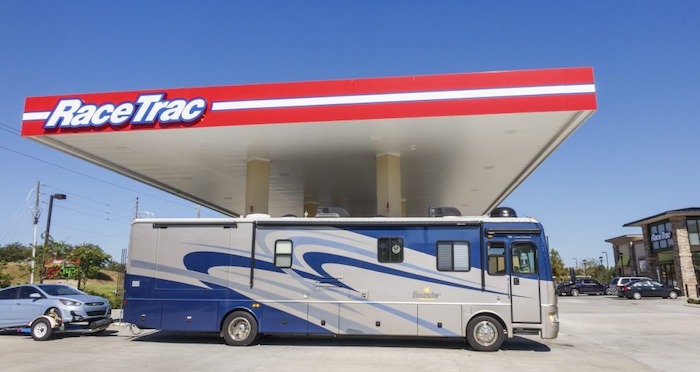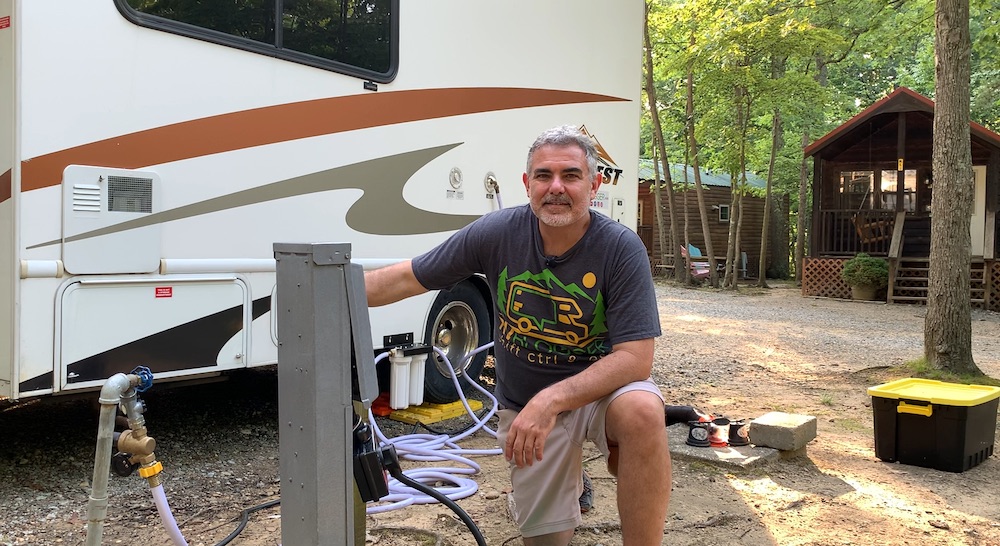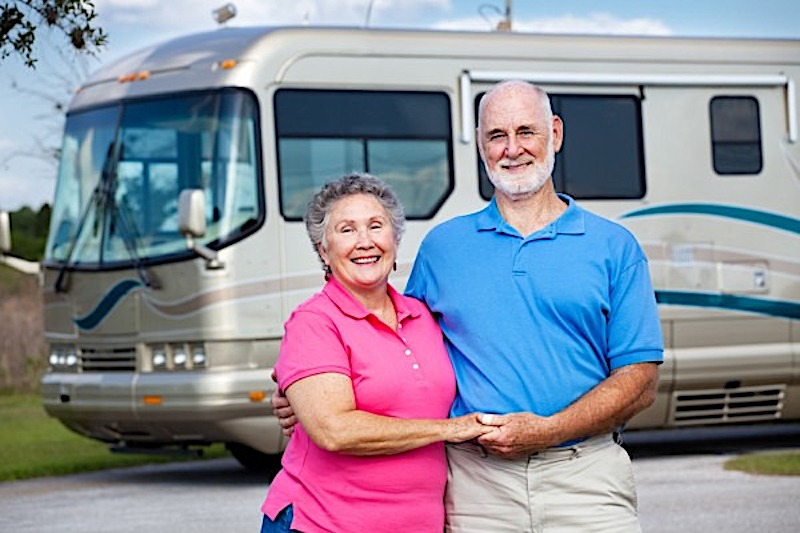Thanks for your support! If you make a purchase using our links in this article, we may make a commission. And, as an Amazon Associate, I earn from qualifying purchases. See the full disclosure here.
Are you considering buying an RV to travel after you retire? You might want to think twice. RVing is not cheap or easy. So, to be sure you are fully informed we came up with our list of 15 Reasons You Will Regret an RV in Retirement.
1. RVs Are Incredibly Expensive
2. You Wil Spend Lots of Money on the Décor
3. Your RV Will Depreciate in Value
4. RVs Use a lot of Fuel
5. You Need to Buy Extra Insurance
6. Health Care Can Be a Hassle
7. You Need to Deal with Your Own Waste
8. Campsites Are Close Together
9. RVs Can be Difficult to Drive
10. It Can Get Lonely on the Road
11. You Will Need to Sell Many of Your Things
12. Repairs Can Get Expensive
13. Overnight Parking Can Bring Challenges
14. You Might Need to Get a Job
15. RVing Can Be Exhausting
Retirement is a big transitional point in your life. You have probably spent over 40 years working, and now you have nothing to occupy your day to day life. You might have hobbies and things you enjoy doing, but it is unlikely that you have something that occupies your time like a full-time job.
As a result, you might turn to something like RVing to keep you busy. RVing can be very enjoyable and lead to many great experiences. However, there are some downsides to it that not a lot of people think of when they start out. So, you can certainly take on the RV lifestyle once you enter retirement, but you should make sure you are aware of the reasons you might regret it.
15 Reasons You Might Regret Purchasing an RV in Retirement
When you enter retirement you will have a lot of free time. As a result, purchasing an RV and heading out on the road might sound very appealing. After all, you will have the opportunity to see new places, do new things, and meet new people. The experiences you have while traveling in an RV are fantastic. However, there are several downsides to purchasing an RV in retirement. Here are 15 reasons you might regret purchasing an RV in retirement.
1. RVs Are Incredibly Expensive
Everyone enters retirement with different levels of wealth. As a result, your ability to make big purchases will vary significantly from your neighbors. So, if you are operating on a smaller budget, you might not be able to commit to a big investment like an RV. There are some pop-up trailers that can be as cheap as $6000, and those will be affordable for most retirees. However, some RVs can reach prices that top $100,000 depending on the size and amenities.
The last thing you want to do is hemorrhage your future by purchasing an RV you cannot afford. So, you need to make sure you consult with your financial advisor to make an RV is something you can afford.
2. You Will Spend Lots of Money on RV and Camping Gear
Even if you can afford to purchase an RV outright, that is not the end of your RV related expenses. You will still need to purchase thousands of dollars of equipment needed to operate your RV correctly. Things like the sewer hose, water hose, water pressure regulator, water filter, camp chairs, outdoor patio mat, lantern, outdoor table, and the list goes on and on…
3. Your RV Will Depreciate in Value
Most people know that vehicles are not great investments because they do not hold their value. The same is true with RVs as they depreciate in value over time. Therefore, when you want to sell your RV, you will be selling it at a significant loss. Just because it is a home, does not mean it rises in value like one. An RV is more like a car than a house when it comes to its value. As a result, you need to be prepared to absorb the loss of several thousands of dollars if you want to enjoy RVing during retirement.
4. RVs Use a Lot of Fuel

Continuing with the monetary theme, RVs use up a lot of fuel. This should not be surprising because RVs are much larger than regular vehicles. The typical drivable RV gets 6-8 miles per gallon. So, you will need to stop to fill up on gas more often. Not only will this be more expensive, but it will make trips take longer as you will be spending more time at the gas station.
Also, since you will be using more gas, you will be doing more damage to the environment. We know there are many people that do not have an issue with this, but RVs are not ecologically friendly.
5. You Need to Buy Extra RV Insurance
When you purchase an RV, you will need to get insurance with it. That just adds another expense to everything you were paying for already. You can see how expenses keep piling up when you purchase an RV.
If you own a vehicle, your auto policy should provide basic liability coverage for a trailer you haul behind you. However, if you have an RV or motorhome that you drive yourself, your auto insurance will not cover it. As a result, you will need to purchase insurance from an RV insurance company.
Additionally, many insurers will have add-on insurance for RVs. Costs of insurance will vary significantly based on your driving record, where you live, and what kind of RV you own.
There are a few types of RV insurance, the first being total loss replacement. This type of insurance will replace your new RV with a comparable new RV if you experience a total loss within a specified time. Replacement cost personal effects is another type which covers damages to your personal belongings inside your RV.
Furthermore, you can get campsite liability insurance which covers injuries and property damage when you are traveling and living in your RV for extended periods of time. Finally, you can get roadside assistance insurance that covers emergency expenses like lodging and transportation if your RV is out of commission for whatever reason.
For additional info about RV insurance please see our article called How Much Does RV Insurance Cost?
6. Health Care Can Be a Hassle
When you are on the road and away from your regular home, it can be a hassle to deal with healthcare concerns. You could be far away from your family doctors, and your insurer’s network of medical providers and facilities.
If you do go out on the road, it is important to make sure Walmart pharmacies are in-network in your plan because Walmart’s are everywhere.
7. You Need to Deal with Your Own Waste

When you enter retirement you might be interested in RV travel because parts of the lifestyle seem glamorous and exciting. However, no one tells you about the dreadful parts of RVing. Most notably, you need to deal with your own waste. It’s not difficult to hook up your RV’s sewer system but it does require kneeling, bending over, and stooping to get low enough to make the connections. You will have separate tanks of wastewater, and you need to constantly track it to see when it gets full.
8. RV Campsites Are Close Together
As much as you might like the idea of meeting new people in retirement, you probably do not want to be around your neighbors all the time. Unfortunately, campsites within a campground are usually pretty close together. Therefore, you will not have much of an opportunity to get away from the other RVers that are staying at the campground. Every time you go for a walk you will need to talk to the people living next to you, which can get exhausting.
9. RVs Can be Difficult to Drive
If you are entering retirement and you are planning on getting an RV, you probably know how to drive. However, just because you can drive a regular car does not mean you will be able to drive an RV. You do not need a special license to drive an RV, but they are much more challenging to drive than other vehicles.
This is because they are much larger and bulkier. You need to be more aware of your surroundings, and they are more difficult to handle. As a result, you need to drive slower, and you need to be prepared for the steep learning curve to come.
Your dealer will give you the basic information you need to prepare for driving an RV before handing over the keys. However, you will need to practice a lot before you are fully comfortable. It might be a good idea to search online for RV driving schools if you are not comfortable. These can be very helpful, but that is adding another expense to the RV lifestyle.
For more information please see our article called Is RV Driving School Worth the Money?
10. It Can Get Lonely on the Road
Even though we mentioned earlier that you might want to get away from your neighbors, it can get lonely on the road. You will be surrounded by people all the time, but they will not be people that you know well. If you are traveling alone it is easy to get lonely and homesick. As much as you might like the escape from everyday life, you will miss home sooner than you expect.
Even if you are traveling with a spouse, it can still get lonely driving around the person with only one loved one. You will not be around your other friends and family, and you might feel like you are missing out on important things like birthdays and holidays. We miss the grandkids when we are away. So, before you start on the RV retirement lifestyle, make sure you are prepared for the homesickness that might accompany it.
11. You Will Need to Sell Many of Your Things
When you decide to uproot your life and take on the RV lifestyle, you may need to sell many of your things. If you are planning on living in your RV full time, you will probably be selling your house. If that is the case, there is no way you will be able to bring all your possessions with you into your RV. There simply will not be enough space for everything you have accumulated over the years.
As a result, you will need to sell or give away many things that you have a sentimental attachment to. If you are lucky, you will have a relative that is willing to store many of your things while you are away, but not everyone is that lucky. If you do not have that kind of kind relative, you need to be comfortable with selling most of your things.
12. Repairs Can Get Expensive
Expenses have been a major theme on this list so far, and we are not done with them yet. When you enter retirement you will be working on a budget, so being aware of all your expenses is important. As a result, it is important for you to know that RV repairs can be very expensive.
RVs require routine maintenance, and they will break down on occasion. However, you need to remember that it is also your house while you are on the road, with the burdens of water and waste tanks to manage.
Getting repairs can be complicated as well. Your RV dealer will fix things in the living area, but they will not do engine repairs. You will need to find a car dealer that repairs truck engines. So, not only will it be expensive, but you need to get your RV repaired in multiple places.
13. Overnight Parking Can Bring Challenges
If you are not the best at planning things out, it is probably a skill you will want to learn in retirement. That is especially true if you are planning on taking on the RV lifestyle. You will need to figure out where you are going to park every night. An RV is not like a car that you can park on the side of the road to get some sleep if need be. They are large and cumbersome, making it difficult to find places to park them. As a result, you need to make sure that you have reservations at campgrounds every night.
14. You Might Need to Get a Job
The biggest benefit of retirement is that you no longer need to work. Unfortunately, if you are planning on taking up the RV lifestyle, you might not be free of work for long. Many full time RVers will take on part time jobs at campgrounds for a little supplemental income.
Many of these jobs will provide free parking in exchange for part-time work. Depending on your financial situation, you may need to work part-time so that you can pay for this lifestyle. So, if you are not comfortable doing that, the RV lifestyle might not be for you.
If you would like some ideas for extra income see our article called 19 Best Work Camping Jobs for Retired RVers.
15. RVing Can Be Exhausting
Retirement is supposed to be about living your life and taking a much needed break from what life has been for the past 60 years. Although being on the road in your RV can be incredibly enjoyable, it can also be exhausting. You will not have many days where you get to relax, and sometimes you will just want to lie down and watch TV.
You can certainly do that at your campsite, but you will feel guilty about it. Since you are traveling to different places all the time, you will feel like you are missing out on seeing things in an area by taking a day to relax. So, if you are someone who needs a lot of downtime, RVing might not be for you.
Do Not Purchase an RV in Retirement Unless You Are Sure About It
After reading, we hope you have all the information you need to prepare for your retirement. We know there is a lot of information to absorb, but it should all be helpful as you try to decide whether purchasing an RV is worth it. Getting an RV is exciting, and it can lead to many thrilling experiences.
However, it might not be worth it for a variety of reasons. It might be too expensive, you might get lonely on the road, and it might just be too tiring. Regardless of your reasons, you need to make sure you are ready to fully commit to the lifestyle before you purchase an RV. Otherwise, you will be wasting a lot of money you could spend elsewhere.
Consider Renting an RV BEFORE You Buy One
If you haven’t owned an RV before, or in a long time, it might be a good idea to rent an RV for a couple of weeks and see how you like RV life after retirement. In a couple of weeks, you will know if you enjoy the RV retirement lifestyle or if it’s just not for you.
For more info about how and where to rent an RV please see our article called How to Find Affordable Long Term and Monthly RV Rentals.



There are a lot of good points here. Some of the extrapolations on the article’s points seem a little overblown with fear. I started RVing in my 40s, now in my 50s. I added on our RV onto our state farm auto plan and it’s $800 per year. As far as expenses go for a class A diesel- it’s $3000 to 5000 per year for maintenance and upkeep. Our vehicle is 15 years old-I’ve had it for five years. In summary, two things that are needed: an energetic person, and $10000 per year ( travel, maintenance, living, and operating costs).
The above excludes the acquisition cost of the vehicle. I would (and would if I had to do it over again) buy a well-maintained pre-owned vehicle. Just make sure it gets used/driven and maintained per factory schedule. I understand saving money, and factory-scheduled maintenance being overkill in some cases. But, I also understand being stranded on the side of the road in the middle of the night in pouring-down rain…
We travel between 5000-10000 miles per year.